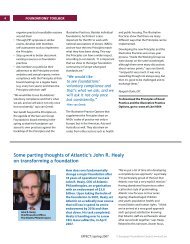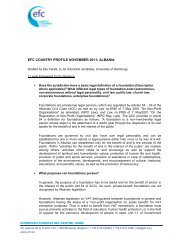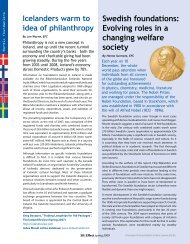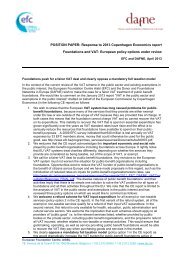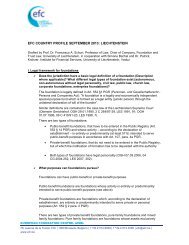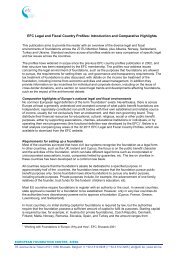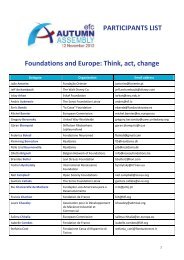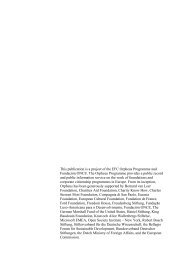European perspectives on global health: a policy glossary
European perspectives on global health: a policy glossary
European perspectives on global health: a policy glossary
Create successful ePaper yourself
Turn your PDF publications into a flip-book with our unique Google optimized e-Paper software.
3. Europe must assert its role in <strong>global</strong> <strong>health</strong> governance<br />
set of financial resources which still mostly reside in<br />
the Official Development Assistance ( ODA ) budgets<br />
of nati<strong>on</strong>-states. Frequently their c<strong>on</strong>diti<strong>on</strong>alities and<br />
the increase in vertical programmes puts additi<strong>on</strong>al<br />
burdens <strong>on</strong> the receiving countries.<br />
Internati<strong>on</strong>al organisati<strong>on</strong>s without a <strong>health</strong><br />
mandate but with important impacts <strong>on</strong><br />
<strong>health</strong> should also be counted am<strong>on</strong>g the key<br />
actors in <strong>global</strong> <strong>health</strong>. While the Word Bank directly<br />
entered the field of <strong>global</strong> <strong>health</strong> in the 1970s, in<br />
close cooperati<strong>on</strong> with the Internati<strong>on</strong>al M<strong>on</strong>etary<br />
Fund, for a l<strong>on</strong>g time it has been directly involved in<br />
the management of foreign exchange problems and<br />
adjustment policies. In particular, during the 1980s and<br />
early 1990s, the so-called Brett<strong>on</strong> Woods instituti<strong>on</strong>s<br />
were severely attacked by NGOs and <strong>global</strong> social<br />
movements for their rather <strong>on</strong>e-sided pressure for<br />
“sound ec<strong>on</strong>omic policies” based <strong>on</strong> structural<br />
adjustment frequently disregarding the impact of<br />
m<strong>on</strong>etary policies and liberalisati<strong>on</strong> strategies <strong>on</strong><br />
social development. Due to the absolute priority given<br />
to austerity programmes for fiscal adjustment and the<br />
favouring of cost-recovery principles in social services,<br />
the c<strong>on</strong>structi<strong>on</strong> of primary <strong>health</strong> care systems in<br />
poor countries fell in disregard.<br />
The WTO has been another internati<strong>on</strong>al organisati<strong>on</strong><br />
with important impacts <strong>on</strong> <strong>global</strong> <strong>health</strong>. In particular,<br />
the Agreement <strong>on</strong> Trade-Related Intellectual Property<br />
Rights ( TRIPS ) created problems regarding access to<br />
new, patented medicines which are sold at high prices<br />
allowing pharmaceutical companies to recover their<br />
R&D costs. As l<strong>on</strong>g as developing countries were not<br />
prevented from producing much cheaper generics, the<br />
results of patent protecti<strong>on</strong> were basically limited to<br />
industrialised countries, which were in a positi<strong>on</strong> to<br />
cope with these problems through <strong>health</strong> insurance<br />
and public <strong>health</strong> systems.<br />
Health services are delivered by public and private<br />
actors. The large play a decisive role in the<br />
development of new, highly effective medicines<br />
and thus also for the treatment of most diseases.<br />
Their inherent for-profit orientati<strong>on</strong> has led to a<br />
c<strong>on</strong>centrati<strong>on</strong> of research and development <strong>on</strong> the<br />
diseases of industrial countries with a capability to<br />
pay high prices for patented drugs – to the neglect<br />
of research <strong>on</strong> diseases mainly prevalent in poor<br />
countries. Due to their specific interests they have<br />
been the major initiators and fervent defenders of<br />
the TRIPS agreement. Nevertheless, due to increasing<br />
public pressure through civil society organisati<strong>on</strong>s<br />
but also UNICEF and WHO ( and to a certain degree<br />
by shareholders ) corporate social resp<strong>on</strong>sibility has<br />
become a factor of increasing weight in corporate<br />
behaviour, leading to cooperati<strong>on</strong> for the provisi<strong>on</strong><br />
of <strong>global</strong> public goods in the form of <strong>global</strong> publicprivate<br />
partnerships ( GPPPs ). In general business<br />
actors in <strong>health</strong> have become central. Health is<br />
now <strong>on</strong>e of the largest private markets in the world ;<br />
industries that endanger <strong>health</strong> – such as tobacco<br />
and alcohol – are am<strong>on</strong>gst the most influential <strong>global</strong><br />
industries, as are industries with a high relevance<br />
to <strong>health</strong>, such as the food industry. Health has also<br />
become an important issue at the World Ec<strong>on</strong>omic<br />
Forum. Medical and pharmaceutical research is a<br />
key area of research and technology development,<br />
and a major factor in innovati<strong>on</strong> and competiti<strong>on</strong><br />
between companies, regi<strong>on</strong>s and nati<strong>on</strong>s. But in many<br />
cases, <strong>health</strong> agendas and ec<strong>on</strong>omic growth and<br />
investment agendas compete rather than complement<br />
<strong>on</strong>e another, and innovati<strong>on</strong> is focused <strong>on</strong> the needs<br />
of the rich rather than the poor countries – as in<br />
pharmaceutical development.<br />
Though NGOs have played a role in <strong>global</strong> <strong>health</strong> for<br />
a l<strong>on</strong>g time ( for example, the Red Cross and religious<br />
and philanthropic organisati<strong>on</strong>s ), during the last two<br />
decades their impact has c<strong>on</strong>siderably increased.<br />
They now c<strong>on</strong>stitute a dense network of actors,<br />
which play an important role in the delivery of <strong>health</strong><br />
services as well as in advocacy work. A set of str<strong>on</strong>g<br />
new n<strong>on</strong>-state players is defining priorities and<br />
approaches. As <strong>global</strong> communicati<strong>on</strong> becomes<br />
easier and cheaper the role of n<strong>on</strong>-governmental<br />
organisati<strong>on</strong>s has become much more prominent<br />
both in setting agendas and in delivering services,<br />
for example Médecins sans Fr<strong>on</strong>tières ( MSF ) or Care<br />
Internati<strong>on</strong>al. Foundati<strong>on</strong>s as major new players have<br />
gained high influence in agenda setting through their<br />
resource-based power in <strong>global</strong> <strong>health</strong>, in particular<br />
the Bill and Melinda Gates Foundati<strong>on</strong>, which spends<br />
about US$1 billi<strong>on</strong> <strong>on</strong> <strong>global</strong> <strong>health</strong> annually. An<br />
increasing number of <strong>global</strong> <strong>health</strong> initiatives – also<br />
within the WHO – are dependent <strong>on</strong> support by this<br />
foundati<strong>on</strong>. The pharmaceutical industry and other<br />
parts of the private sector are increasingly involved<br />
in not-for-profit activities and alliances to improve<br />
Global Health Policy Glossary<br />
39



